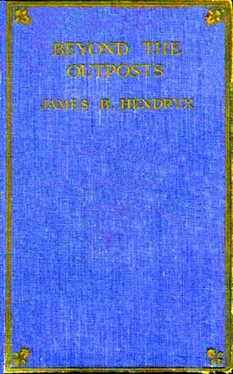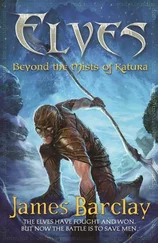“We’re not going into the Eskimo country. We turn south, here—up the Coppermine, through many lakes, across a portage, and on to a great river that flows to the eastward.” The words produced no apparent effect on the three Indians, who continued apparently ill at ease.
Suddenly all faces were turned toward the river. Irma heard a soft, scraping sound and looked up to see an umiak beaching beside the canoes. Two men stepped out onto the gravel, a white man, and another, evidently an Eskimo. This latter wore sealskin boots and clothing of caribou skin. He was bare headed and his black hair, cropped closely in front, hung straight about his neck and ears.
The white man advanced, the other following, and the girl noted with a smile that the three Indians huddled closer about the fire. She scrutinized the man who advanced to within two paces and halted abruptly with an exclamation of surprise:
“Well, I’ll be—! Well, if it ain’t a woman! Say, you’re quite a ways from home ain’t you?”
“Yes, quite,” answered the girl, curtly. She did not like this man. There was something repulsive about him, although, if questioned at the moment, she would have been at a loss to tell what that “something” was. Certainly nothing distinctive or outstanding that would argue for either good or evil. He was of medium height and build. An untidy thatch of faded, straw-coloured hair protruded from beneath the edges of a faded plush cap whose dilapidated visor hung limply against his forehead. Rather shifty eyes of pale, watery blue looked out from above an unkempt, tow-coloured beard, whose scraggly thinness disclosed a pair of thick, loose hanging lips.
The man either did not notice, or chose to ignore the curtness of her reply. He squatted upon his heels and blinked his shifty eyes: “First woman I ever seen in these parts,” he ventured, “except they was squaws or Husky klooches, an’ they don’t count. ’Couse ’taint none of my business, but if it hain’t no secret, I might ask where yer headin’ fer?”
“It is no secret,” answered the girl, “I am going up the Coppermine.”
“Up it!” the man exclaimed. “Down it, you mean, don’t you—to the coast?”
“No, if I had meant down I would have said down. I happen to be going up the river, away from the coast.”
“Well, you’ve picked out a hell of a place to go to. An’ you ain’t got there yet, neither. You’ll find out it’s tracklinin’ most of the ways an’ some long portages around rapids, to boot. What’s the idee of goin’ up the Coppermine? They ain’t nothin’ up there when you git there—nothin’ but muskeg an’ black flies, an’ ’skeeters, an’ gravel, an’ rocks, an’ scrub timber.”
“You have been up there?” asked the girl, quickly. “Recently? Within a year?”
“Well, I didn’t find out what was up there out of no book. Yes, be’n there—guess I’m about the only white man that has.”
“Non,” interrupted Teddy Bye and Bye, “Gus Janier she be’n oop Coppermine, Yellowknife, Fish Reevaire—all over.”
“Gus Janier!” the shifty eyes glittered angrily, “what in hell do you know about Gus Janier?”
“Gus Janier ma frien’,” replied the Indian, with dignity.
“You got a hell of a friend!” exploded the other. “The dam’ dirty hooch pedler!”
“Gus Janier, she ain’ sell no hooch.”
“How does he make his livin’, then? Tell me that? They hain’t no one ever seen him do a tap of work. Rammin’ around the country with that big dog, an’ a couple of guns, an’ a fish pole. Less’n he makes it squealin’ a lot of lies to the Mounted about folks that’s try in’ to make an honest livin’!” The man paused as if expecting a reply, but Teddy Bye and Bye merely shrugged, and stared silently into the fire, and he shifted his glance to the girl: “I s’pose he’s a friend of yourn, too—Gus Janier?”
Irma Boyne flushed angrily at the sneering tones: “Who are you to be questioning me about my friends? As a matter of fact I have never laid eyes on the man, though I have heard him mentioned many times since coming into the North.”
“Ain’t heard much good of him, I guess—less’n you got it from the Mounted—an’ there’s some of them he ain’t got fooled. He ain’t got no one fooled that’s got brains to think with. Guns like he packs, an’ good canoes, an’ ca’tridges costs money. Where does he git it?”
“I presume that is his business,” answered the girl.
“Yes, an’ it’s other folk’s business, too. Wait till Constable Crowley gits somethin’ on him—he’ll show him!” The man suddenly dropped the belligerent tone, “But they hain’t no use wastin’ time talkin’ about him. You was askin’ me had I be’n up the Coppermine, an’ I says ‘yes.’ What about it?”
“And, to the eastward? Have you been in the country east of the Coppermine?”
“Clean to the Bay—that’s me.” The shifty eyes had lost their angry glitter, the voice took on a boastful note. “Only white man that lives in the country reg’lar—except Gus Janier, an’ he’s always on the move. Proves what I say—he don’t dast to stay long in a place. If he’s all right, what’s he always on the go fer?”
“We will leave Janier out of the discussion, please. Your private quarrels are nothing to me. You say you’re the only white man in the whole territory between the Coppermine and Hudson Bay?”
“I said I’m the only one that lives here reg’lar. There’s the Mounted, they come an’ go. An’ the trader at Fullerton, but they change every little while—too lonesome up there fer a man to stick long. An’ fer the last couple of years there’s them fellers up on the coast—Canadian Ar’tic Expedition. I guided some of ’em east as fer as Bathurst inlet. That’s me—wherever they’s an’ honest dollar to be picked up, guidin’, er tradin’, that’s where you’ll find Amos Nixon. That’s about all the white men, except Joe Bernard. He trades up an’ down the coast—an’ mebbe another white man or two scattered around here an’ there.”
The last words caught the girl’s attention. Her father might be included in “the other white man or two.” As Nixon talked, her aversion and disgust for him increased. However, here was a man who professed to know the country through which she intended to travel—might even know her father, or at least give some clue to his whereabouts. “These other white men—where are they?” she asked, “you said there was another white man or two.”
“They might be, an’ they mightn’t,” the man answered evasively. “I didn’t say they was, I said mebbe they was.”
Abruptly, she flashed a direct question: “Where’s John Boyne?” She thought the man started slightly. The shifty eyes swiftly met her own scrutinizing gaze, dropped to the fire, and roved over the faces of the Indians.
“Boyne,” he muttered. “Mr. Boyne. Seems like I hear’n that name som’ers, too. He ain’t one of them Ar’ticers is he? They’s quite a few of ’em, an’ I never did git ’em all stright.”
“No, he’s a prospector. An oldish man, sixty-two, to be exact. Although he looks much younger. He came into this country about a year and a half ago by way of Baker Lake.”
“Baker Lake—Boyne,” repeated the man, “seems like I did hear that name over around the Bay. Mebbe he’s gone outside.”
“No,” answered the girl, “he hasn’t gone outside. He’s prospecting for gold somewhere between here and the Bay.”
“What you huntin’ him fer?”
“He’s my father, and I thought maybe he’d be needing—some help.”
The pale eyes seemed to flicker as the man glanced up, quickly: “Oh, so you’re his gal, eh? An’ figgerin’ on gittin’ in to where he’s at from this side.” A short laugh, followed the words.
Читать дальше












